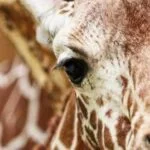World Chimpanzee Day – The Importance of Community
Lorraine has worked in the zoological industry for over 16 years in zoos and wildlife parks both in the UK and overseas. Specialising in primates, and in particular great apes, she has consulted on a project to bring the first Gorillas into New Zealand. Lorraine has worked in sanctuaries and conservation organisations in Southeast Asia, Africa and Central America. She has a keen interest in conservation and animal welfare and spent time as the welfare coordinator at an elephant park in Thailand. Lorraine now works as a zoological consultant specialising in great apes in Western Australia and has authored a children’s book about conservation.
As I trekked through Kibali National Park in Uganda on a warm April morning I could feel the mud shift beneath my heavy walking boots. It had rained the night before and a fresh earthy smell lingered in the air as I made my way through the forest, moving branches out of my way as I pushed through the thick vegetation. I could hear birds chirping and the wind blowing through the leaves when all of a sudden, a branch cracked to my left, trees shook and a deep thud came from my right. I quickly turned towards the noise but couldn’t see what had made it. Another crash of broken branches, this time straight in front of me. I stood silently waiting for what I thought had made the noise to come into view. I scanned the forest floor and then turned towards the canopy as the sun shone through the tree tops and as I shielded my eyes, that oh so familiar hooting noise began to reverberate through the whole forest. Deafeningly loud, I knew they must be very close by, when all of a sudden, I spotted one. A lone chimp, sat on the lower branches of a fig tree, reaching up to grab leaves from the branch above her. My peripheral vision started to pick up movement and before long other chimps began to come into view, some so close I began to wonder how I hadn’t seen them before.
The leader of my group moved us on, deeper into the forest to where some of the chimps had stopped to rest. Several of the chimps moved with us along the forest floor, some running past and shaking branches in a territorial display of dominance whilst others sat peacefully in the trees, foraging for leaves and fruits.
Witnessing wild chimp behaviour is always incredibly rewarding and absolutely fascinating. There is always so much going on, as much of a chimp’s life revolves around social behaviours. Even from a very young age chimps will play fight with other troop members in order to learn, groom other chimps to build social bonds, travel in the company of others for protection, threaten other chimps to assess and maintain hierarchy, and simply spend time in the company of others to maintain the strong relationships that they will need to survive. Hand gestures, facial expressions, body posture as well as tactile communication, and an array of vocalizations, such as pant hoots, screams, whoops, barks, and panting are almost continuous within the troop showing the importance of social behaviours.
As I sat watching a small group of four grooming each other on a fallen log, an older female was grooming a large male, whilst another female groomed a youngster, I noticed this group was large and complex. A whole community was being unveiled before my eyes, every individual playing a vital role to ensure the troop thrived.
After witnessing so many of these animals living together and relying on each other so heavily, it was unfathomable to consider how even now chimps are still sometimes housed individually or in pairs. These large, boisterous apes have often been seen as aggressive or difficult to manage and as a result are occasionally still kept in very small and therefore unnatural groups to minimize the risk of fights and injuries. As time has passed and we have learnt more about the social lives of these amazing apes, we have realized that their energetic and sometimes intense ways of communicating are a vital part of their social dynamic and how they work as a community, making these large diverse groups imperative to their overall welfare.
Very much like a human community there are different roles within it. The role of a dominant male is to protect the troop and maintain order amongst its members, other males will act as allies to the dominant male and help protect the troop. Stronger females provide support, whilst others offer a more nurturing role to youngsters. Older individuals provide a wealth of knowledge and often a more calming presence. Even infants and juveniles offer playmates an opportunity to learn and test boundaries. Many of these relationships are not and cannot always be positive and calm. Fighting, displaying, chasing, even wounding are all very common amongst these large groups of primates. Many of these behaviours are often unfairly characterized as negative or undesirable…..but are they?
In order for chimps to communicate, express their feelings and fulfill their role in their troop they must exhibit some of these more extreme behaviours. The dominant male may need to fight off a rival or assert his dominance over another. Females may need to discipline juvenile animals and males may need to threaten an intruder. Older individuals may need to show they will protect another in order to afford the same protection in return. Youngsters may also need to practice some of these behaviours through play in order to learn social complexities for when they need them later in life. This makes not only large natural communities vital to the welfare of these animals but also allowing them to express these larger-than-life behaviours as and when they need too.
By enabling chimps under human care to experience these large, naturalistic groups, and the complex social environment that goes with it, we are allowing them to express their true personalities, create meaningful relationships and find their place within their troop, which enhances their welfare.
The introduction of chimpanzees into larger groups, in order to achieve these communities can be a long and arduous process, but the welfare benefits of making such a commitment are undeniable. Chimpanzee introductions can be risky but if managed correctly the results can not only benefit the individual but the whole troop.
Support for facilitating these kinds of introductions is available and can help you and your facility create a better environment and welfare outcome for your chimps. Organisations such as the Great Ape Consultancy can provide theoretical or practical support for chimpanzee introductions.
The views, opinions and positions expressed by guest bloggers are theirs alone, and do not necessarily reflect the opinions of Wild Welfare or any employee thereof. Wild Welfare is not responsible for the accuracy of any of the information supplied by the guest bloggers. We accept no liability for any errors, omissions or representations. The copyright of this content belongs to the author and any liability with regards to infringement of intellectual property rights remains with them.





